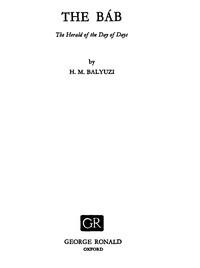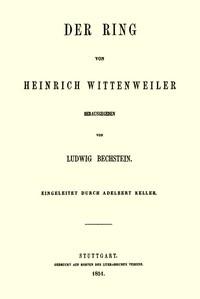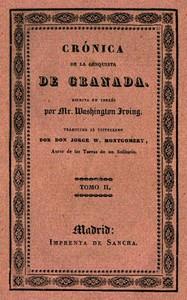Read this ebook for free! No credit card needed, absolutely nothing to pay.
Words: 91769 in 43 pages
This is an ebook sharing website. You can read the uploaded ebooks for free here. No credit cards needed, nothing to pay. If you want to own a digital copy of the ebook, or want to read offline with your favorite ebook-reader, then you can choose to buy and download the ebook.


: The Báb: The Herald of the Day of Days by Balyuzi H M - Bahai Faith; Bab Ali Muhammad Shirazi 1819-1850
About the time that the thirteen colonies of North America were gaining their independence to form the nucleus of the mighty Republic of the West, France was inching her way towards a revolution such as the world had never seen, and Britain was striding along the road to a revolution of a different kind, industrial, agrarian and economic in nature, a cleric of the Islamic ?`ah persuasion left his island-home in the Persian Gulf for the great centres of ?`ah learning and ?`ah devotion in `Ir?q. His purpose was to find a much larger audience in order to give voice to thoughts and presentiments that had developed with his years.
ay A?mad-i-A?s?'? , the founder of the ay? school, belonged to the ancient tribe of Ban?-?ar, and his family originated from the region of A?s? on the Arabian mainland. His father's name was ay Zayni'd-D?n, and Ba?rayn had been their home. ay A?mad first visited Najaf, where the Tomb of `Al?, the first Im?m, cousin and son-in-law of the Prophet Mu?ammad, is situated. Then in Karbil?, close by the Shrine of the martyred ?usayn, the third Im?m, he began to preach and a circle of earnest students gathered round him. He asked the leading ?`ah divines of the holy cities of `Ir?q to issue him a licence which would give him recognition as a mujtahid in his own right, that is, a divine empowered to interpret and prescribe. They all declared that they considered ay A?mad to be a man of knowledge and talent superior to their own, and that their testimonial was written solely at his request.
The fame of ay A?mad soon spread throughout ?r?n. Fat?-`Al? ?h and Mu?ammad-`Al? M?rz?, a son of the ?h who held the life-long tenure of the governorship of Kirm?n?h, were particularly desirous to meet him. But ay A?mad preferred to go to ?r?n by way of B?ihr in the south, rather than by the nearer and more accessible route of Kirm?n?h in the west. From B?ihr he went to ?r?z and thence to Yazd, where he stayed for a number of years. Siyyid K??im-i-Rat?, a young man barely out of his teens, who shared the same views, joined him there . ay A?mad was then making his final arrangements to go on pilgrimage to the holy city of Mahad, prior to his visit to ?ihr?n. He received Siyyid K??im with great affection and asked him to remain at Yazd to take up his own patient work of many years. In Mahad and later in ?ihr?n, ay A?mad was shown every mark of high respect and reverence.
Eventually Siyyid K??im travelled north to be in his company, and together they went to Kirm?n?h, as the Prince-Governor had been urgently begging his father to let ay A?mad visit him. They stayed in Kirm?n?h as long as the Governor lived. After his premature death, they departed for Karbil?, where ay A?mad, his zeal unabated and his powers untouched by advancing years, preached and taught. He was in his early eighties when he took the road to Mecca and Medina. From that journey he did not return and lies buried in the famed cemetery of Baqi`, in the vicinity of the Tomb of the Prophet Mu?ammad.
ay A?mad's constant theme was the near advent of the Deliverer of the Latter Days, promised to the world of Isl?m, the Q?'im of the House of Mu?ammad or the Mihd? . In the course of his last pilgrimage to the holy cities of Arabia, he told a merchant from I?fah?n who was with him: 'You will attain the presence of the B?b; salute Him on my behalf.' ay A?mad did not believe in physical resurrection nor in the physical ascent of the Prophet Mu?ammad to heaven on the night that the Angel Gabriel took Him to view the celestial world. Mi`r?j was an experience of the spirit, ay A?mad maintained. Moreover he asserted that the signs and portents of the coming of the Q?'im, given by the Prophet and the Im?ms, were allegorical. These and similar doctrines were anathema to the orthodox, but while ay A?mad lived, royal patronage muted their hostile criticism.
Siyyid K??im , who, in accordance with the will of ay A?mad, succeeded him in guiding his disciples, was the son of Siyyid Q?sim of Rat, a town in northern ?r?n close to the Caspian Sea. He came from a family of well-known merchants and was no more than thirty-three years old when he occupied the seat of authority. The orthodox divines now began their vitriolic assaults in earnest until, at last, Siyyid K??im felt that he needed solid support in ?r?n from the ranks of the orthodox. For that purpose he chose one of his ablest disciples, Mull? ?usayn, a native of the small town of Bur?yih in ur?s?n, to go to I?fah?n and secure the aid of ??j? Siyyid Mu?ammad-B?qir-i-Rat?, a noted divine whose influence was felt far and wide. Mull? ?usayn succeeded brilliantly in accomplishing the mission entrusted to him, obtained the support of that famous man in writing, and then proceeded to Mahad to acquire a similar pledge from yet another powerful divine.
In the meantime not only did Siyyid K??im suffer from the intrigues and onslaughts of his adversaries headed by Siyyid Ibr?h?m-i-Qazv?n?, but the whole of Karbil? was thrown into turmoil. These disorders were of long standing and gradually the authority of the Ottoman government had ceased to exist. Within the town there were several factions at odds with one another, but all determined to resist the re-establishment of Ottoman power. Two successive V?l?s of `Ir?q tried to force the people of Karbil? to submission, but failed conspicuously. However, in the closing months of the year 1842, Naj?b P??, a man resolute and even obstinate, came to occupy the post of V?l?. Affairs in Karbil? had gradually gone from bad to worse. Lawlessness had increased and mob rule prevailed. Naj?b P??'s first thought was to resolve this problem which had baffled his predecessors. He tried to negotiate a settlement, but neither he nor the rebels of Karbil? could really trust one another. Naj?b P?? moved near-by to Musayyib and sent Sar`askar Sa`du'll?h P?? with a small force to reduce the town. Negotiations proceeded apace. Emissaries came and went. Persian princes, who lived in Karbil?, took part in the negotiations, but nothing was achieved.
During those fatal weeks, at the end of the year 1842 and the beginning of 1843, Siyyid K??im, who was greatly respected both for his wisdom and humanity, took a leading role, urging all parties to act with moderation and in a spirit of conciliation. Twice, in company with a small delegation, he visited the camps of Naj?b P?? and Sa`du'll?h P?? outside Karbil?. Lieutenant-Colonel Farrant, the British Special Commissioner, reported his efforts to Constantinople:
The Chief Priest Hajee Seid Kausem did all in his power to prevent hostilities, he preached against their proceedings, he was abused and threatened, they would not listen to him--this I have heard from many people at Kerbella--at this time all were unanimous in defending the place
... to the very last he entreated them to listen to the Pacha but without avail, he shewed great courage on the occasion, as he had all the chief Geramees and Mollahs against him.
?h claimed the throne of ?r?n. He showed great benevolence towards the divines of Karbil? and Najaf, sent them money and stood up for them. However, he was unsuccessful and betook himself to Karbil?. There he fell on hard times and suffered poverty. He expected the divines to come to his help and applied to them, one by one. But none heeded him. One night he and his family had to go to bed hungry. At midnight he heard a knock on his door. When he opened it he found someone, who had pulled his `ab? over his head so as to hide his face. This man put a purse with money in it into his hands and went away.
'Time passed. Indigence and want recurred. Again the same person, head covered with `ab?, came at midnight, handed a sum of money and went away without a word. To the repeated question "who are you?" he gave no answer. Then, that man came a third time with a purse containing money. This time `Al?-?h followed him and saw him enter the house of ??j? Siyyid K??im and shut the door. `Al?-?h related this event in many gatherings. He used to say: "O people! I am not a ay?, but this deed is the work of righteousness. None but a man of truth would act in this way."'
Free books android app tbrJar TBR JAR Read Free books online gutenberg
More posts by @FreeBooks

: Der Ring by Wittenweiler Heinrich Active Th Century Keller Adelbert Von Commentator Bechstein Ludwig Editor - German poetry Middle High German 1050-1500; Verse satire German


: Folk-Lore and Legends: Russian and Polish by Tibbitts Charles John Editor - Legends Russia (Federation); Legends Poland





